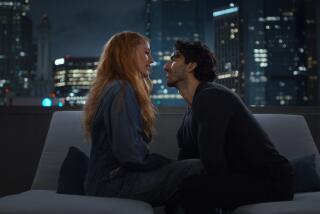Egyptian Moviemakers Coming Clean
- Share via
CAIRO — A few years ago, a brief nude scene in “American Beauty” that made it past Egypt’s censors prompted some moviegoers to stand up and shout in protest. So theater owners cut the scene themselves.
With Egyptians becoming increasingly religious -- and socially conservative -- it’s not just government officials who see censorship as necessary. Even some artists, who traditionally bemoan infringements on their creativity, say censorship may be the only way to cope with conservative Islam.
“We used to protest censorship,” said film director Inas el-Degheidi, known for tackling such touchy themes as teenage sexuality and gender equality in Egyptian society. “But now, society has developed in such a way that censorship sometimes works in favor of the artist, shielding him from society.”
What happens here has far-reaching repercussions. Egypt is home to the Middle East’s biggest film industry, and countries all over the region show Egyptian movies and TV shows.
It’s not just sexual themes that draw attention.
In June, censors banned the international hit “The Matrix Reloaded,” saying it questions the nature of God. The movie’s setting in a fictional place known as Zion may have been a factor too -- the first Matrix film was shown in Egypt but was criticized by some Islamic newspapers that claimed it espoused Zionism.
The Arab confrontation with Israel often is portrayed as a moral issue by Islamic conservatives. A passing reference to Israel was snipped from Mel Gibson’s “What Women Want.”
Sometimes, censors’ decisions have nothing to do with religion or politics. “The Mummy” was banned as supposedly offensive to Egyptian heritage.
Many writers and directors are angry over censorship. “Disagree with me, but don’t confiscate my opinions or ban my movies,” well-known director Dawood Abdel-Sayed said recently.
But some artists have mixed feelings about censorship, given the role of conservative Islam in Egyptian society.
Lenin al-Ramly, a noted playwright and screenwriter, said he worries that religious extremists might exploit freewheeling material to promote their campaign to turn Egypt into an Islamic state. “Society is not ready to be without censorship,” he said.
Egypt’s censors -- and its people -- were not always so uptight. In the 1960s and ‘70s, movies shot here were much more daring, often featuring scantily clad women and more overt references to sex.
“Until around 1975, there was a high degree of freedom,” said Ali Abu Shadi, former head of the Egyptian Censorship Board.
“But then religious fundamentalism set in ... and things really have not changed much since then. In the back of every censor’s mind is society. The state itself seems to be unable to deal with society right now. The level of conservatism is very high.”
Over the last 30 years, Egyptians and other Arabs have increasingly turned to Islam after various political and economic movements -- Arab nationalism, socialism, capitalism -- failed to improve their lives.
More women began wearing headscarves -- and some also donned head-to-toe robes -- and more men grew beards as a sign of Islamic piety. In the 1980s and early ‘90s, the trend turned violent as extremists attacked and burned video clubs and other entertainment establishments that offended religious sensibilities.
In this climate, Egyptian newspapers have been quick to criticize overt sensuality and intimacy in movies, with columnists and critics castigating actresses who dare to appear on screen in bikinis and other attire that challenges Islam’s requirement of female modesty.
The result has been many moviemakers avoiding risque material and producing what has become known as “clean cinema.”
Foreign movies are readily available uncut on satellite TV, over the Internet or as bootleg videos or DVDs on the streets of Cairo. But few Egyptians can afford them.
“We censor things for both [rich and poor], but those who are able can get their hands on what we banned or censored,” Abu Shadi, the former censor, conceded.
“Honestly, I worry very little about this [wealthy] segment of society. They are open-minded, well exposed to the outside world and have the awareness to distinguish between fact and fiction,” he said. “Others do not have that awareness, education or sophistication and might react with violence or more extremism” to controversial content.
Al-Ramly, the writer, believes that years of strict censorship may have helped promote extremism by cutting off the free expression of ideas.
“Decades of oppression created generations that do not know what freedom is, what having an independent voice is like,” he said.
More to Read
Only good movies
Get the Indie Focus newsletter, Mark Olsen's weekly guide to the world of cinema.
You may occasionally receive promotional content from the Los Angeles Times.










